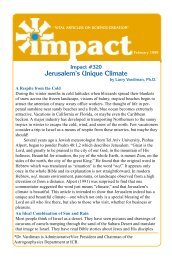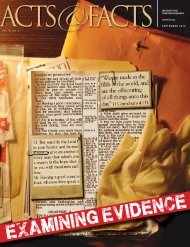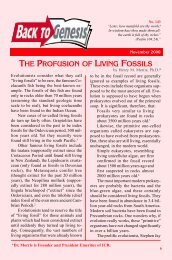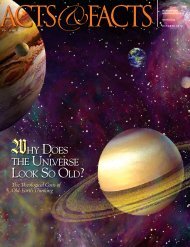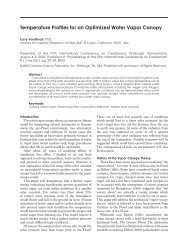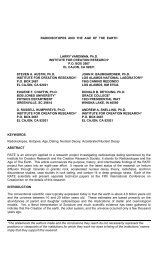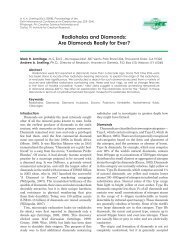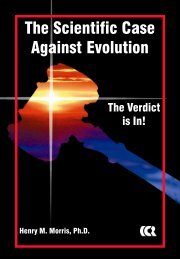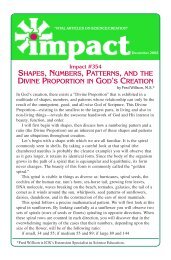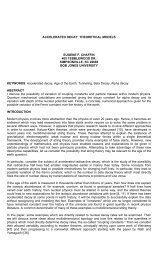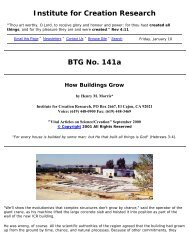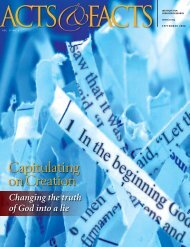ACTS&FACTS - The Institute for Creation Research
ACTS&FACTS - The Institute for Creation Research
ACTS&FACTS - The Institute for Creation Research
Create successful ePaper yourself
Turn your PDF publications into a flip-book with our unique Google optimized e-Paper software.
IMPACT<strong>The</strong> fact is that no one really knows thedate of His birth, so no one should be dogmaticon this subject. Nevertheless, there isone particularly intriguing possibility: Onthe night Christ was born, shepherds were inthe field watching their sheep (Luke 2:8). Althoughit is barely possible that this could be inlate December, it seems far more likely that itwould be sometime in the early fall.If so, the birth of Jesus also would havebeen in the fall, and it is significant that therewas an ancient Christian feast called Michaelmas,observed on September 29 by many earlyChristians, especially in England and westernEurope. <strong>The</strong> name later also was appropriatedto identify a period during the fall when certaincourts were in session.In any case, the name “Michaelmas”meant “Michael sent,” just as“Christmas” means “Christ sent.”It is very probable that Michaelwas the “angel of the Lord” (Luke2:9) who was sent from heaven toannounce the birth of Jesus to theshepherds. <strong>The</strong> feast of Michaelmasthus may well have originatedto commemorate this coming ofMichael and the angels to welcome Jesus at Hishuman birth.This date would be just several days be<strong>for</strong>ethe great Feast of Tabernacles, which thepre-exilic Israelites observed each fall in gratitude<strong>for</strong> the annual harvest, with each familydwelling <strong>for</strong> a time in a tent, or “tabernacle.”When John wrote that “the Word was madeflesh, and dwelt among us” (John 1:14), hedid not use the usual Greek word <strong>for</strong> “dwell.”Instead, he said, literally, that the Word (thatis, the Creator) “tabernacled” among us <strong>for</strong> atime. It was as though He had come into theworld at just the appropriate time <strong>for</strong> the joyfulFeast of Tabernacles, as Michael and the angelssang of “good tidings of great joy, which shallbe to all people” (Luke 2:10).As glorious as the birth of Christ mayhave seemed, however, this was not His incarnation.He had already been “made inthe likeness of men” (Philippians 2:7) ninemonths earlier, when He created a body <strong>for</strong>Himself and took up His residence in Mary’swomb. That was the time when “the Wordwas made flesh”!And so it may be beautifully significantthat the real “Christmas” (i.e., “Christ sent”),when the Christ was sent from His throne inheaven to enter a “tabernacle” of flesh, wouldhave been nine months earlier than “Michaelmas,”when Michael and the angels were sentto announce His birth. But that brings us backto December 25 again! <strong>The</strong> actual number ofdays between the two dates is 278, which is theideal period of human gestation.Whether or not these inferences are correct(and remember no one really knows whenChrist was born), they at least yield a greaterHow appropriate it would be <strong>for</strong> Him toenter the world right at the season ofdarkest and longest night, <strong>for</strong> He wouldcome as “the light of the world.”appreciation of His miraculous conception.How appropriate it would be <strong>for</strong> Him to enterthe world right at the season of darkestand longest night, <strong>for</strong> He would come as “thelight of the world” (John 8:12) to bring “lifeand immortality to light through the gospel”(2 Timothy 1:10). <strong>The</strong>n, at “Christmas” time,we can remember with deep thanksgiving (notwith Saturnalian revelry and pagan greed) theamazing Christmas gift of God Himself, when“God sent his only begotten Son into the world,that we might live through him” (1 John 4:9).Why Did the Creator Become Man?No question that begins with “Why?”can be answered scientifically. Such questionscan be answered only theologically,and that means they can only be truly answeredfrom the written Word of God. Andthis greatest of all questions has the mostwonderful of all answers!For God sent not his Son into the worldto condemn the world; but that the worldthrough him might be saved. (John 3:17)When the fulness of the time was come,God sent <strong>for</strong>th his Son, made of a woman,made under the law, to redeem them thatwere under the law. (Galatians 4:4-5)This is a faithful saying, and worthy of allacceptation, that Christ Jesus came intothe world to save sinners. (1 Timothy1:15)But that is not all, of course. His firstcoming, followed by His sacrificial death,bodily resurrection, and glorious ascension, isa prophetic promise of His second coming.At His first coming, He “tabernacled”among us <strong>for</strong> a little while; at His second coming,there will be “a great voice outof heaven saying, Behold, the tabernacleof God is with men, andhe will dwell with them, and theyshall be his people, and God himselfshall be with them, and be theirGod. And God shall wipe away alltears from their eyes; and thereshall be no more death, neithersorrow, nor crying, neither shall there be anymore pain: <strong>for</strong> the <strong>for</strong>mer things are passedaway” (Revelation 21:3-4). “And there shall beno night there;...<strong>for</strong> the Lord God giveth themlight: and they shall reign <strong>for</strong> ever and ever”(Revelation 22:5).How infinitely sad it is that so manytoday reject or ignore such a gracious, loving,holy, powerful Creator/Redeemer. Not onlydo they miss all the true meaning and blessingof Christmas now, but, unless they respond toHim in repentance and faith, they will be everlastinglyseparated from Him in the gloriouseternal ages to come.Adapted from Dr. Morris’ article“When God Became Man”in the December 1993 editionof Acts & Facts.Dr. Morris (1918-2006) wasFounder of the <strong>Institute</strong> <strong>for</strong><strong>Creation</strong> <strong>Research</strong>.12 ACTS&<strong>FACTS</strong> • DECEMBER 2008



